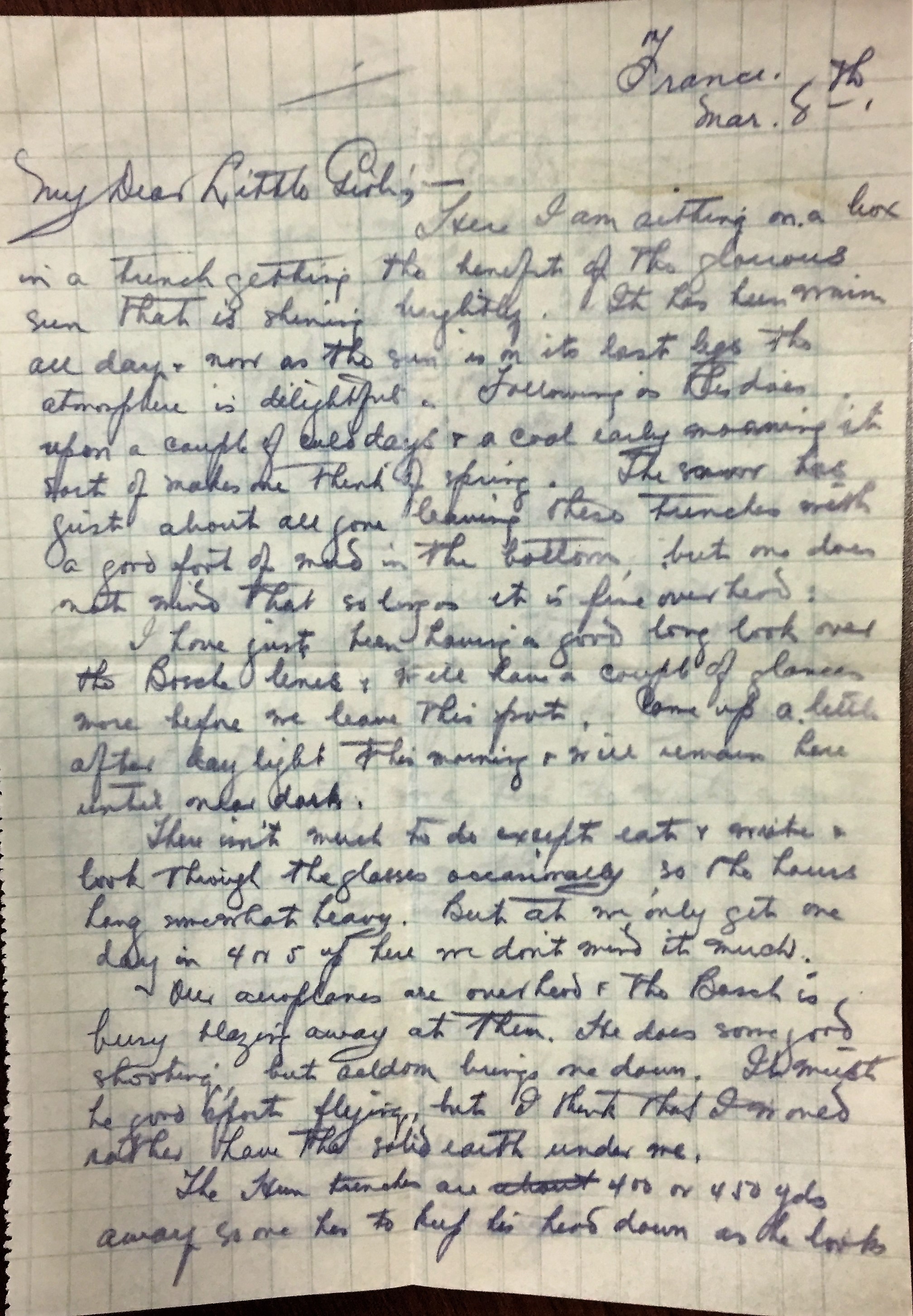Tucked away in the Nova Scotia Archives are letters so alive with love they almost have a heartbeat.
The hundreds of yellowing pages stretch across time and an ocean, connecting Helen Jones and Reg Roome during the First World War and its aftermath.
But those weathered pages only make the script stand out more starkly, revealing stories marked by a soldier’s passion and vulnerability. Alternating between fear and hope of what the future might hold — both for the world and for himself and his “Dear Little Girl.”
In the first surviving letter filed with the archives, the pair is already separated — he at Pine Hill Divinity Hall in Halifax and she in Dartmouth, N.S.
The letters contained within this story have been edited for length.
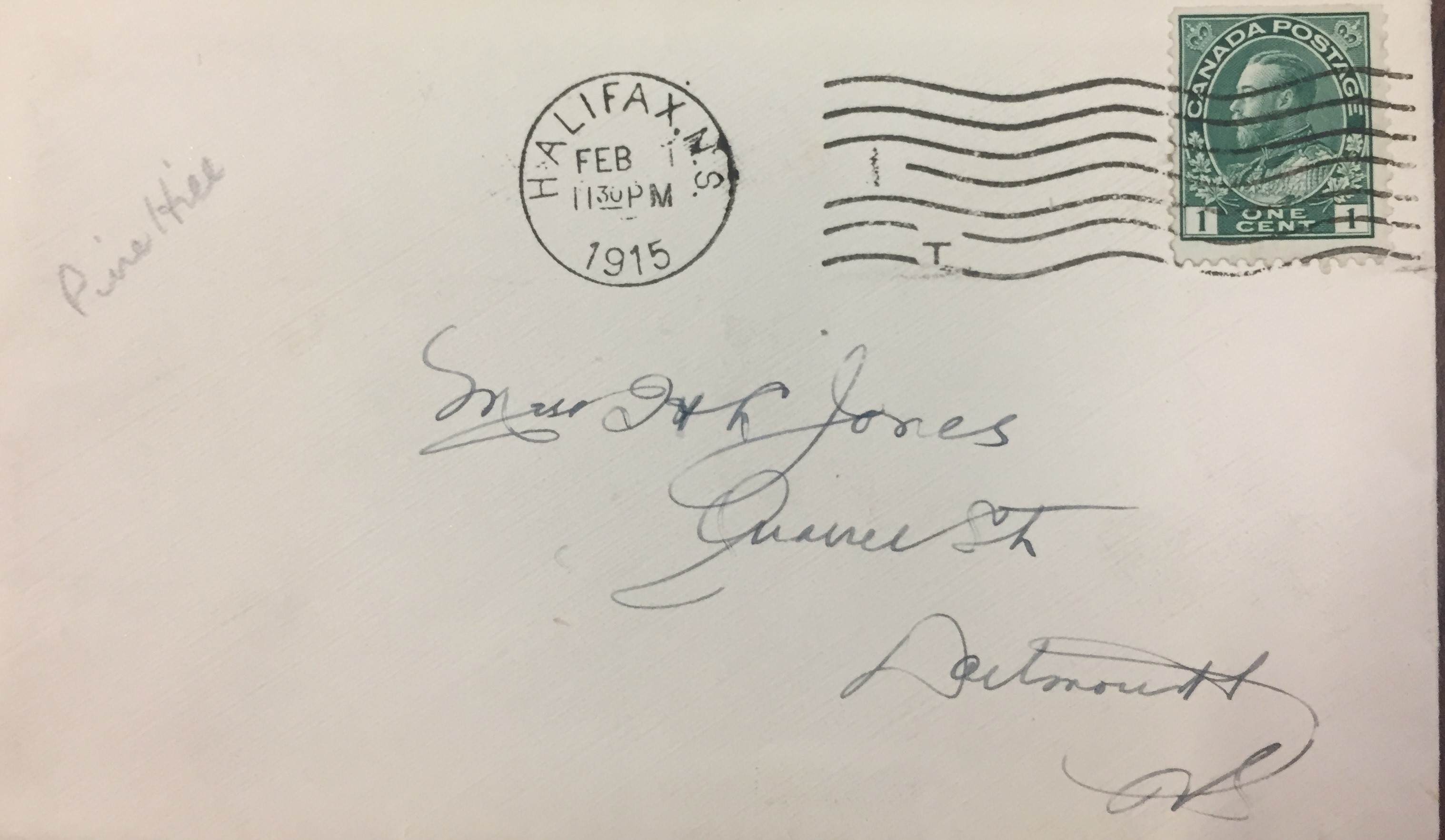
Feb. 1, 1915
My Dear Little Girl,
I suppose by this time that you are sound asleep in [your] bunk and enjoying dreamland. Well, I’m not going to “waste” much time over this so after a few little scratches, will hit the sheets myself.
… About six of the boys received their “marching orders” tonight and tomorrow go the the Dr.’s office to be examined for the front. They join the medical corps. Some of them expect to leave for England Saturday.
I do hope that when you receive this you will be feeling a little better than you were when I telephoned today. For the life of me, I couldn’t make out what was up, whether you didn’t want to say something that someone might hear or whether you felt rather, on the other hand, that perhaps something was wrong with the person at the end of the line. I’d have rung you up later again to try to reach a conclusion, if it were not probable that you would have been in bed.
However, I’ll know tomorrow.
Now Little Girlie, I must take this out to the box and file into bed. It’s freezing tonight so I supposed that means snowshoeing. Sorry, I want to be able to get over some night — but it’s a no go for the present.
Good night for this trip,
Reg
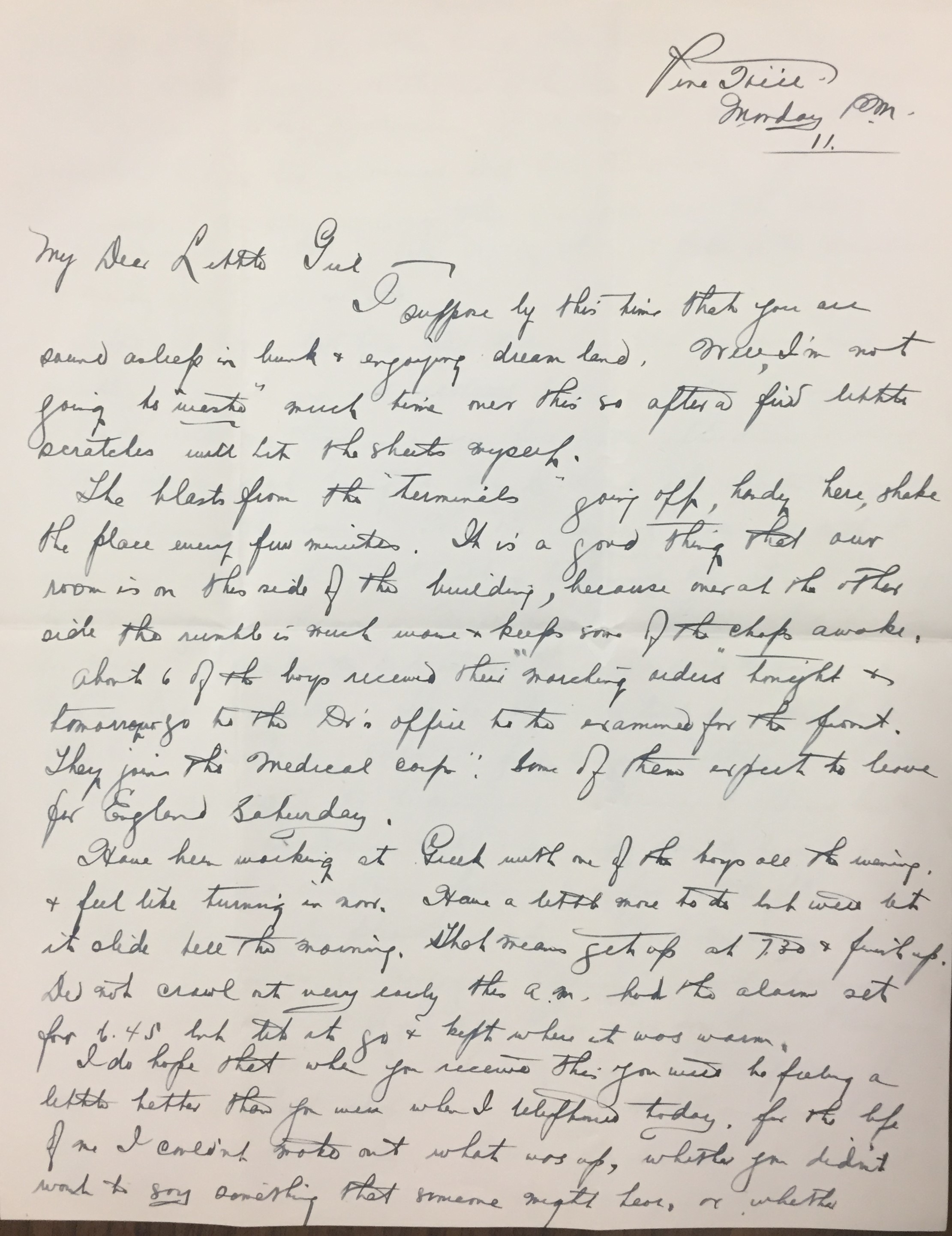
The letter arrived at Helen’s King Street home in Dartmouth the next day, but it’s unclear how she responded. Her own replies aren’t stored in the archives.
But her diaries offer glimpses into her life and, sometimes, her heart. She studied the flute and the piano; music was one of the great joys of her life, her grandson Howard van Allen says. She was athletic — and van Allen believes she and Reg may have met at a Dartmouth tennis club.
And, her diaries show, she always looked forward to hearing from her beloved.
May 31, 1915
Dear Little Sweetheart,
The frisk has struck me tonight, so here goes for a note. Perhaps I may amuse you for a few minutes tomorrow.
I have just come in from a trip to the Orpheus by my “lonesome.” The movie expresses my feelings to a T. My it feels strange to be so near — and yet you might as well be 1,000 miles away tonight. I kind of hope against hope that when I turn a corner it may be to run into you. Do I sound foolish? you ask. Isn’t that what I used to say in my letters of last year? Well, I’m there tonight, whether foolish or otherwise.
What have you been doing today? I supposed the same old studying, I hope you practised hard for you just have to come out away up in your exams or you needn’t tell me how you get along at all.
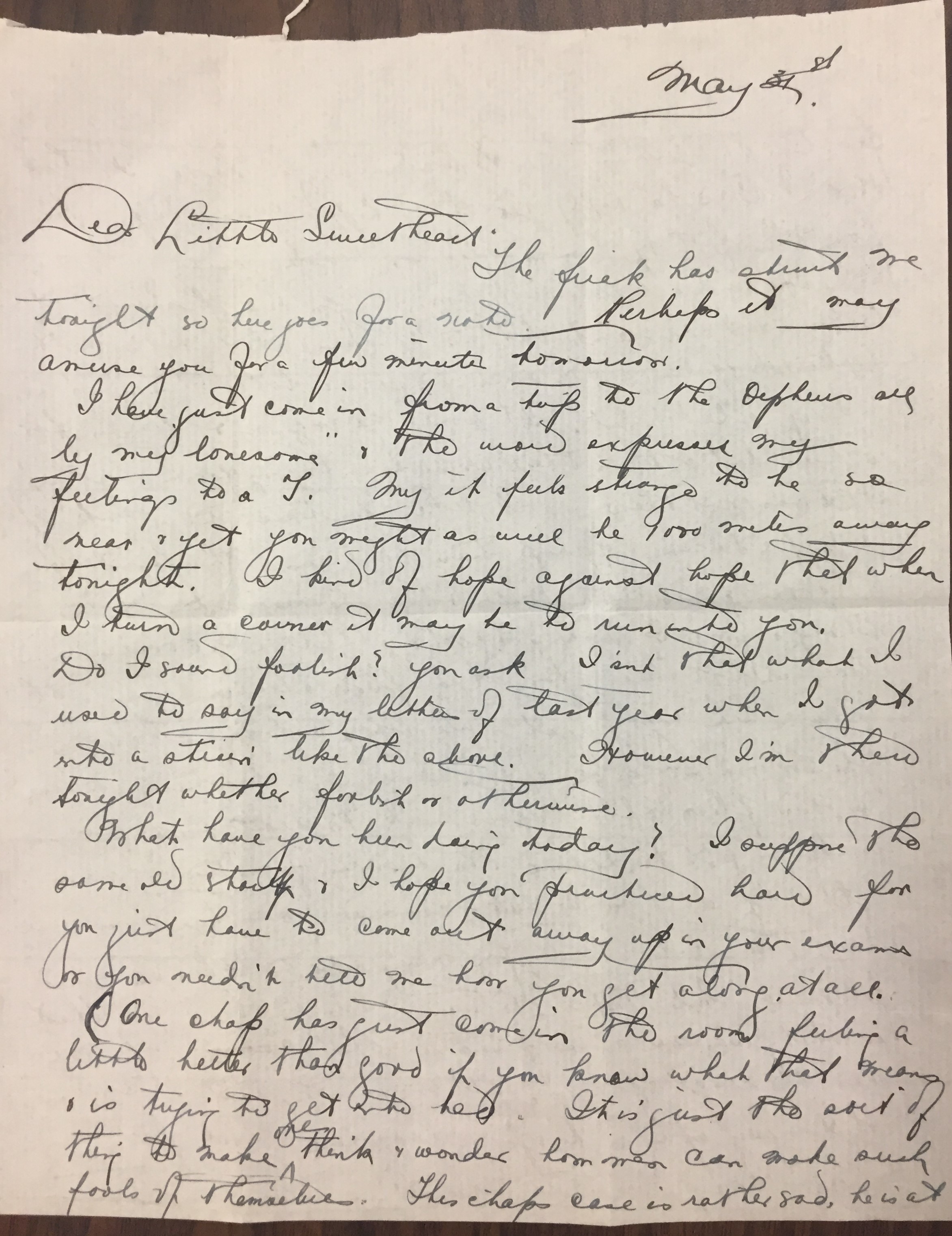
One chap has just come in the room feeling a little better than good if you know what that means and is trying to get into bed. It is just the sort of thing to make one think and wonder how men came make such fools of themselves … I guess it is up to me to go over and take his clothes off now.
How strange it is. I have to contrast it with my own case. I have had a, well, I can almost say enjoyable evening at the show, had an ice cream on the way up — the whole thing costing me about 25 cents — and now I am happy writing to you. And the morrow, what of it? In all likelihood a grand day and I trust ending up with my little sweetheart and a kiss that I can feel now. Have I not much to be thankful for? Am I not lucky? And should not my life show this good fortune (if I may call it so) in many ways? There are some questions for you to help me in solving. I often ponder over them and can only see one course ahead.
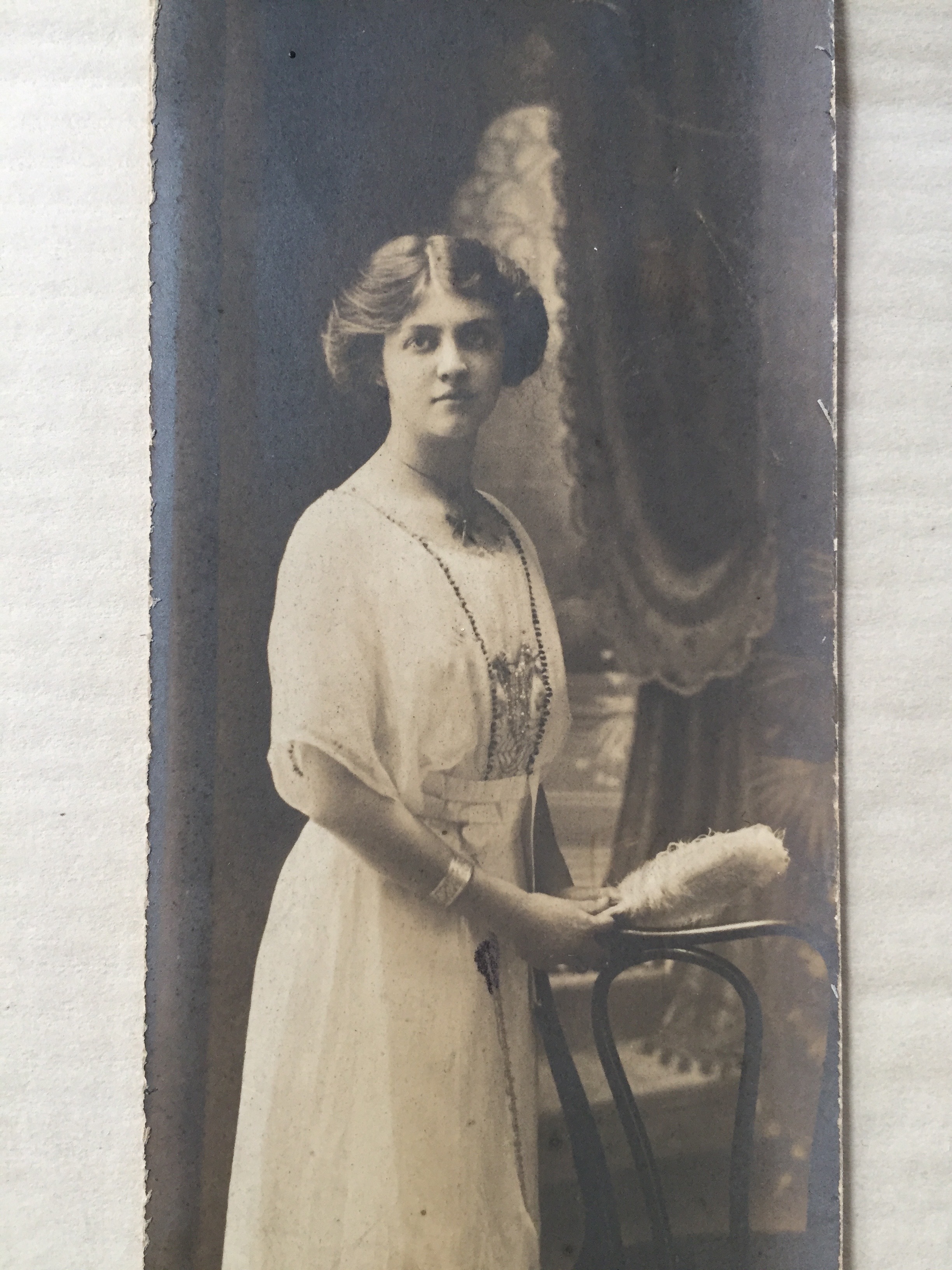
Well, well, Helen, where am I taking you? Away off into philosophy, I suppose you will call it. I venture to call it Life. The grand, the noble, the fascinating problem of living. Sometimes, you know, I think that I could be happy, yes truly happy, away off far from the bother of human uproar, hidden away in some place of grandeur alone with you.
You have pictured it to me and I can see it, but, no dearie, that would not be true happiness. I’m sure we would both tire of it in a very short while. It would be gorgeous and lovely for a time, but I think there would be a longing for a something that was not there. I like sometimes to think of a different scene, perhaps two pictures: the first of a room filled with books and all the necessities of a library and you and I reading together Alice in Wonderland. We are both tired, for it is after a strenuous day, and oh how we are enjoying it and are happy as happy can be.
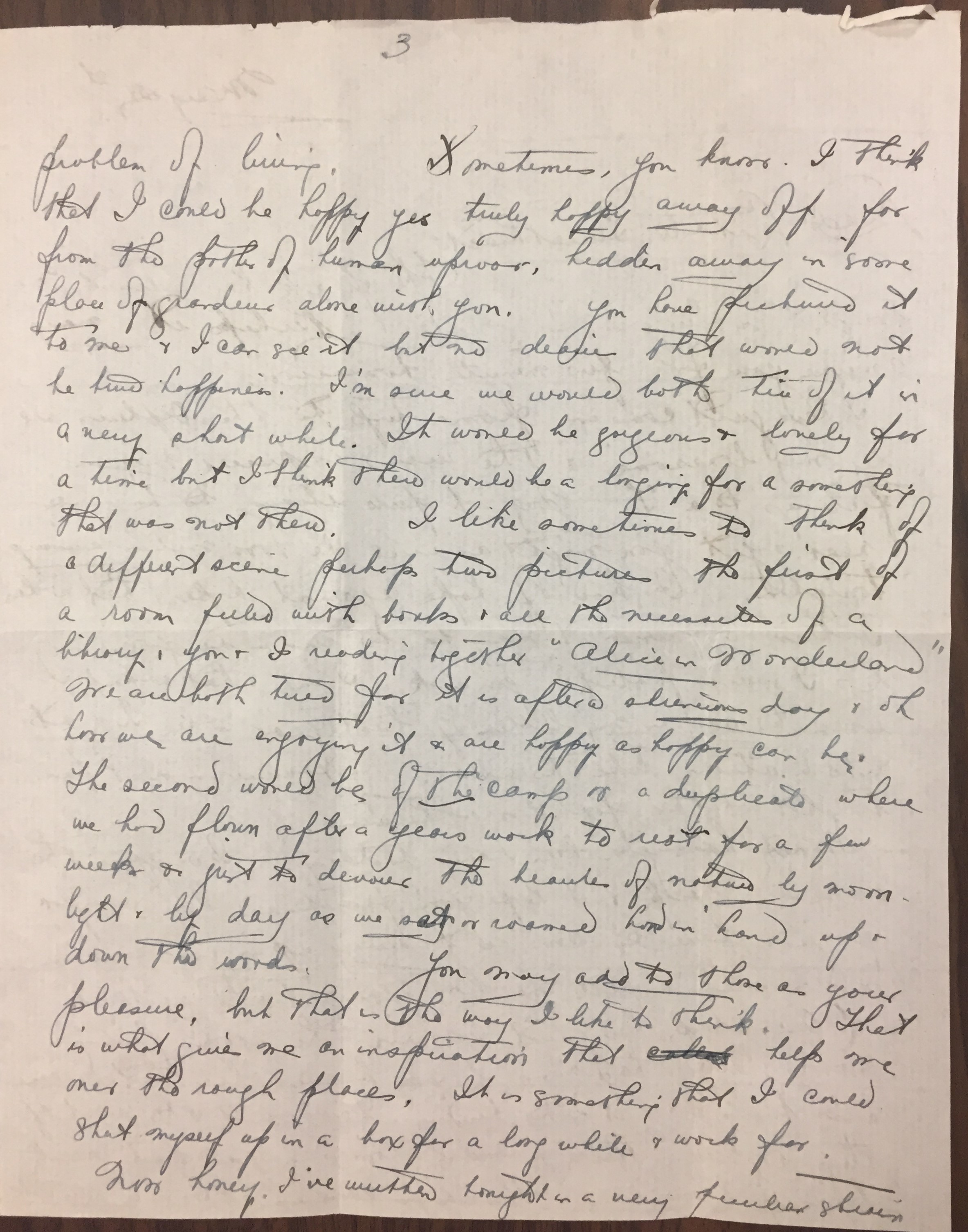
Now honey, I’ve written in a very peculiar sheen, but it is so long since I have written you and so much has happened since my last letter that I forget what you like me to say, what you want me to say and what I want to say myself.
One thing, I do remember you want me to put down in cold blue ink and even in blood, so I’ll try not to tease but feel the truth and say that I love you still.
Your Reg
Ps. Lights go out soon so I have no time for more. Will call you up tomorrow. R.
Reg had just turned 23 when he wrote the letter above. It’s the second last he would send Helen from Nova Scotia.
June 9, 1915
My Dear Little Girl,
First and most important, I suppose that you have heard the news. This time I think that it is sure and that we will be on the water some time this side of Sunday. That is about all I can think of at present. It does not seem possible, after so many disappointments that we are really going. The boys seem to be going crazy; by tomorrow there will be no holding them. There is to be a parade of every man in the battery then and the news will come to us officially.
My, it is so long since I have seen you and so long since I promised to write you and again so long since talking with you that it is hard to find much to write about. Writing is at its heart but a very poor apology for speech and when I think that it will be but a short time till I can tell you all the news, my pen fails in its attempt to note down what I will only repeat on Friday if not sooner.
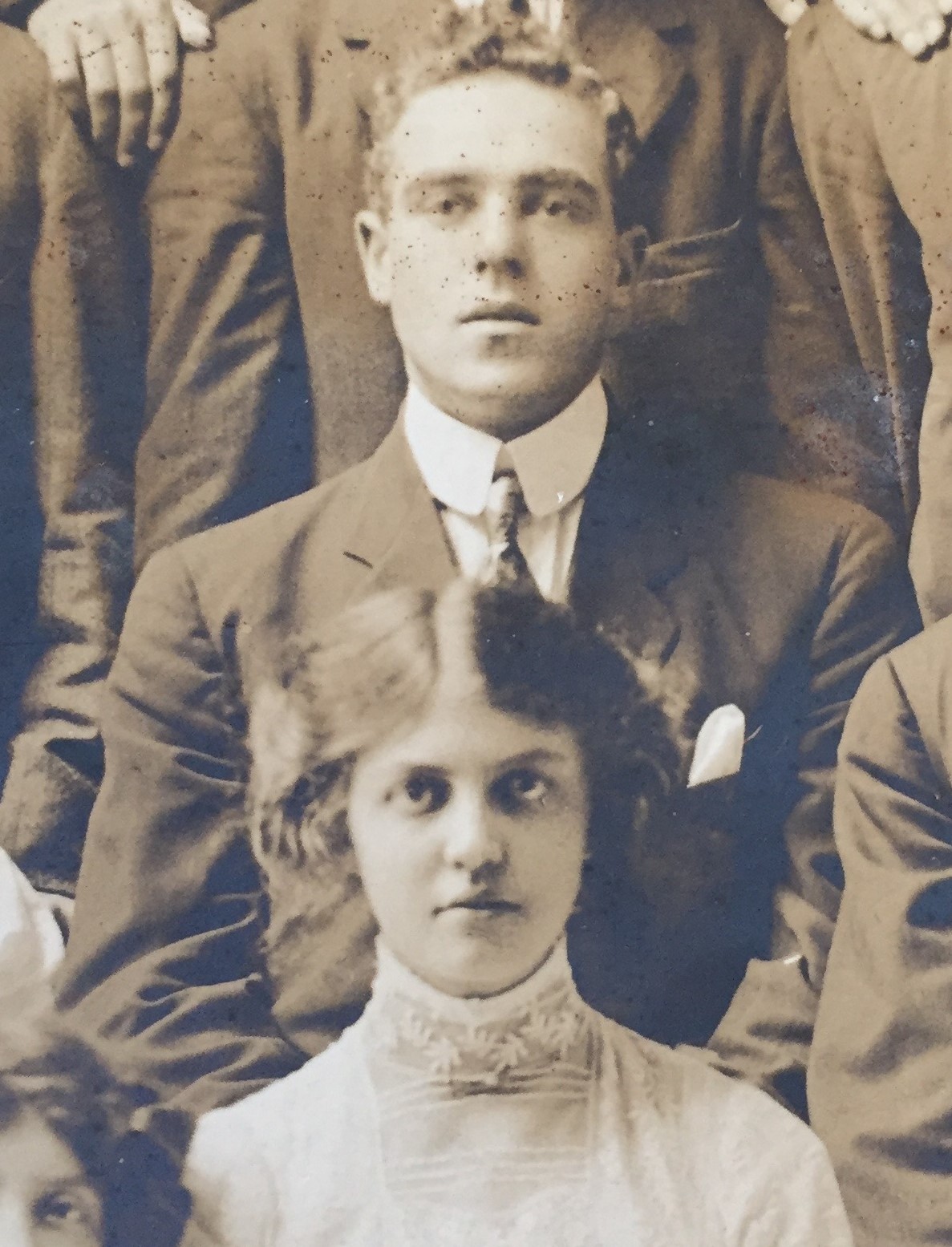
That Friday would be the last time the two saw one other for 10 months. Days later, Reg shipped out aboard the S.S. Caledonia to serve in the Royal Canadian Artillery. He describes being surrounded by nothing “but sea and sky … Men are stretched out on deck in all shapes and forms, some sleeping, others reading and, again, many writing.”
But before he left Nova Scotia, Reg and Helen had a very memorable goodbye, a moment he carried with him aboard the Caledonia and moved his writing to passion as well.
June 15, 1915
My Dearest, Sweetest Little Girlie,
Here we all are just about the same as yesterday, lying around on the deck. There is a little more of a swell running now than there has been yet and most of us are feeling a trifle light-headed but have not been actually sick.
Oh you dear, dear little treasure. I just could not help crying as I read what you had written and the tears rolled down my cheeks as I thanked God for having given me such a little treasure as you are. Dearest if I should lose you I dare not think what I should do for I love you so much and want you with all my heart and soul just for myself. I could be happy anywhere with my “Little Girl.”
It seems that at the base of love is the union of sexes … but I differ. Others (I know some) marry simply because it is the lawful and prescribed way of indulging in the passions which by nature are in us all. But no. I claim that happiness is not found by such. Love is higher. Why cannot a wife be a man’s best friend? Why not his confidante? Why cannot the two by [combining] energies … make their lives count for more than either could simply?
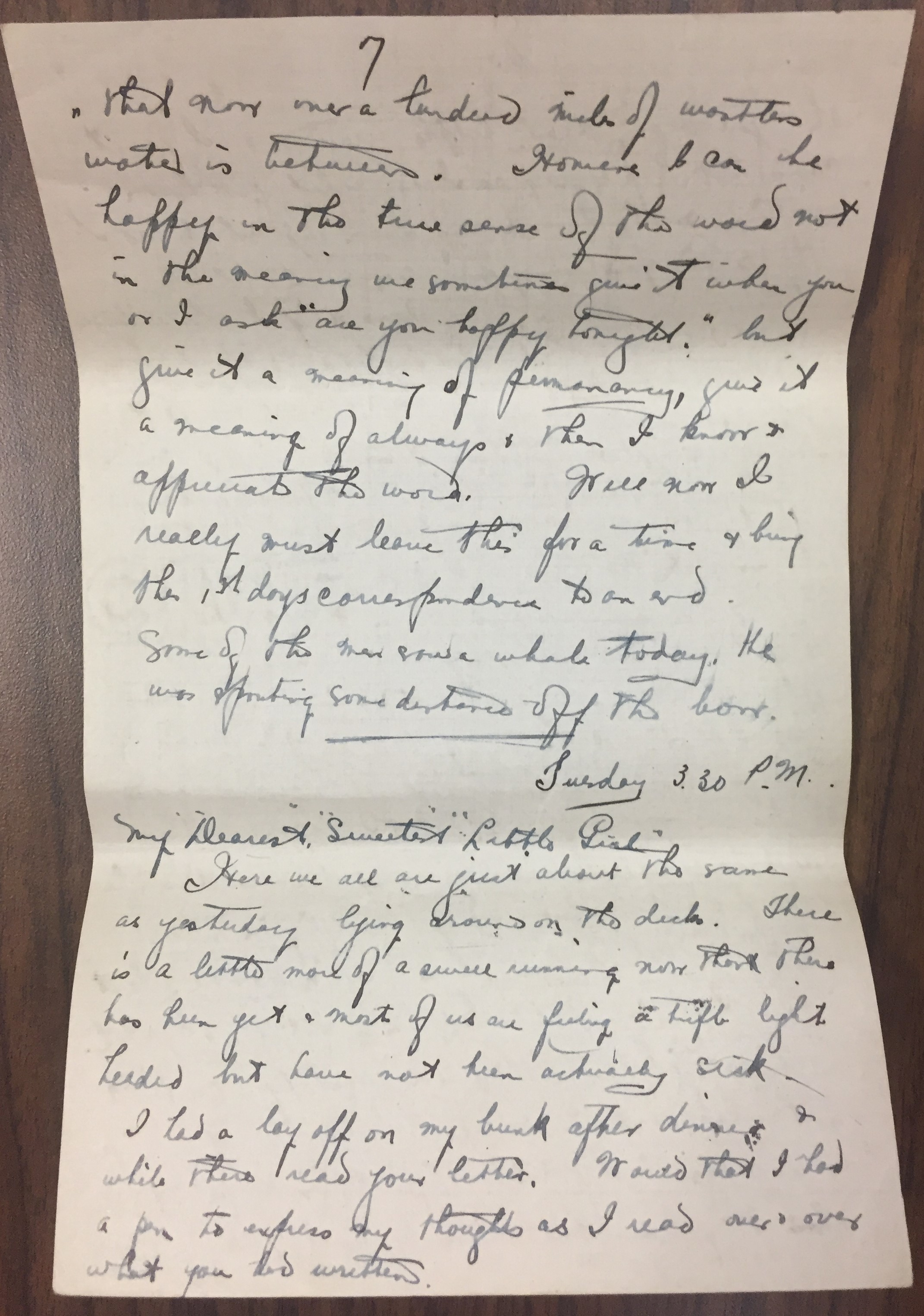
And dearest, how much you have helped me so far. I used to think that perhaps it was not the right thing for me to “fall in love” when there was so much ahead of me. But as time went on, and I knew you better, those feelings gradually left me. You grew more and more into the woman I had imagined, more and more I watched your faith and admired your goodness for I can find no other word to express it; you had emerged in a simplicity and a purity, which was hard for me to realize.
You had nothing to fear from the future because of past follies — while I had a fight and a struggle ahead against ideas and thoughts and follies formed and committed in earlier times.
Why all this? Well it was no temptation to you to have me holding you in my arms; you were innocent, you cured me with a pure and unsullied love. To have me with you was satisfying in itself.
"I never in my life was so tempted and never came so near falling."
But with me, who had had the fire of my passions aroused by girls who I cannot think of in the same thought as you, I do know that men under similar circumstances have fallen and I thank god that I had the power to check myself. I never in my life was so tempted and never came so near falling. I think it was because I love you that it was so and again because I loved you so much that I can still feel that there is more in love than many think.
It has taken me some time to pen all this; I could not talk to you in the same way. You know it is hard to speak on such a subject. But you have made it easier for me and I trust that we both understand and I’m sure that we have been drawn quite a little closer together because of such confidences. Why these things are seemingly banned from discussion I cannot understand, but it seems they generally are, except [in] the most intimate friendship etc. etc.
Now dearest, I think I will have to leave this for a while. Oh! I do pray that we will both be proud to be united again in health and strength and to work along our journey together.
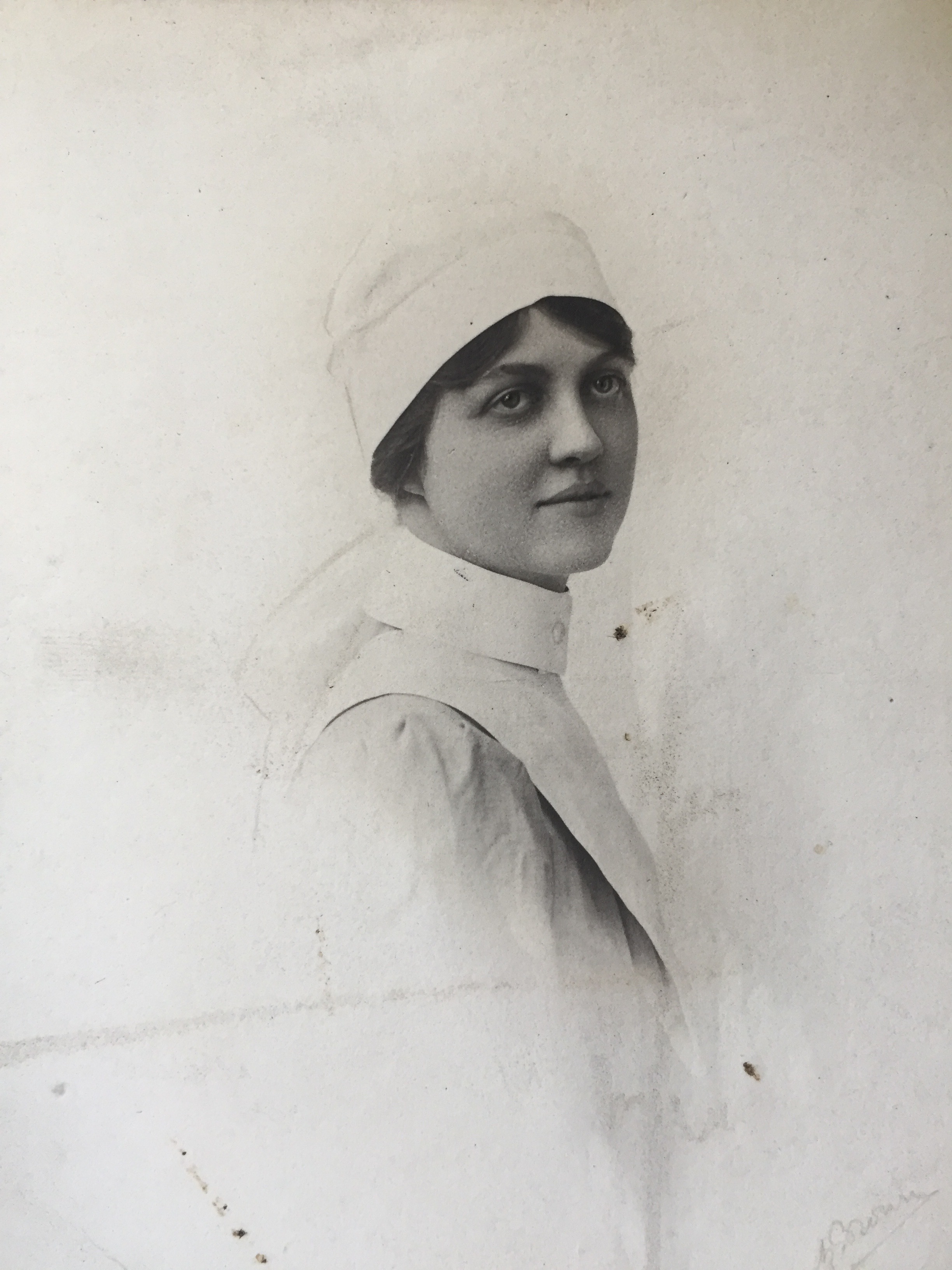
That journey together continued in England.
Reg arrived in Plymouth after 10 days at sea. By the fall, he would be commissioned into the British army and see combat in France and Belgium.
Helen graduated from the St. John’s Ambulance nursing program in November 1915. She arrived in Britain in time for the first of four Christmases she would spend in a military hospital.
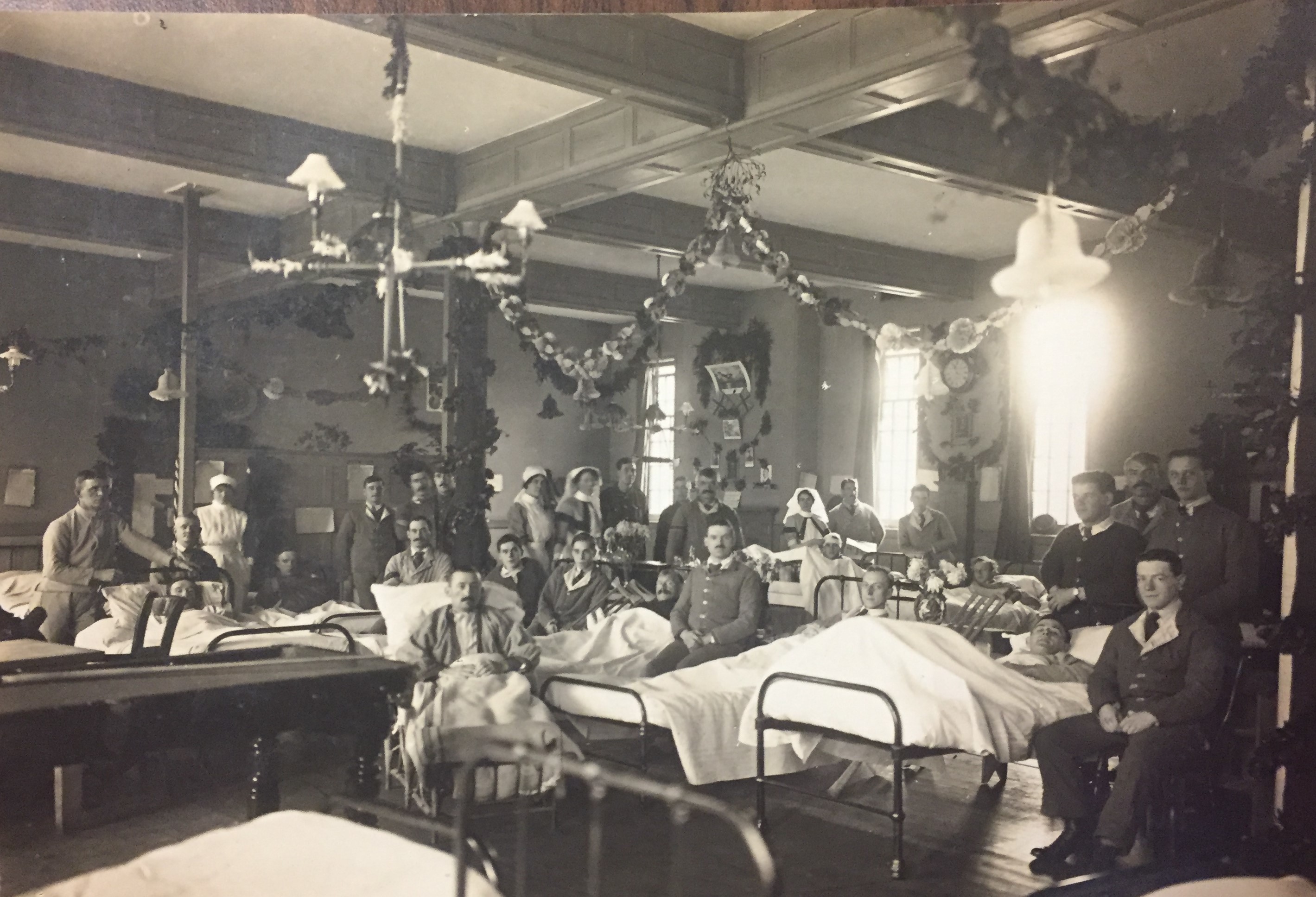
Helen and Reg reunited in April 1916 in London; he got leave from his unit and she from the hospital.
The pair dined and shopped and went to movies. And there, Reg proposed, according to Helen’s diary entry from April 16, 1916.
We went to Drury Lane, where we saw Birth of a Nation. Reg slipped my ring on when the lights went out! Such a beauty. Had a very good dinner.
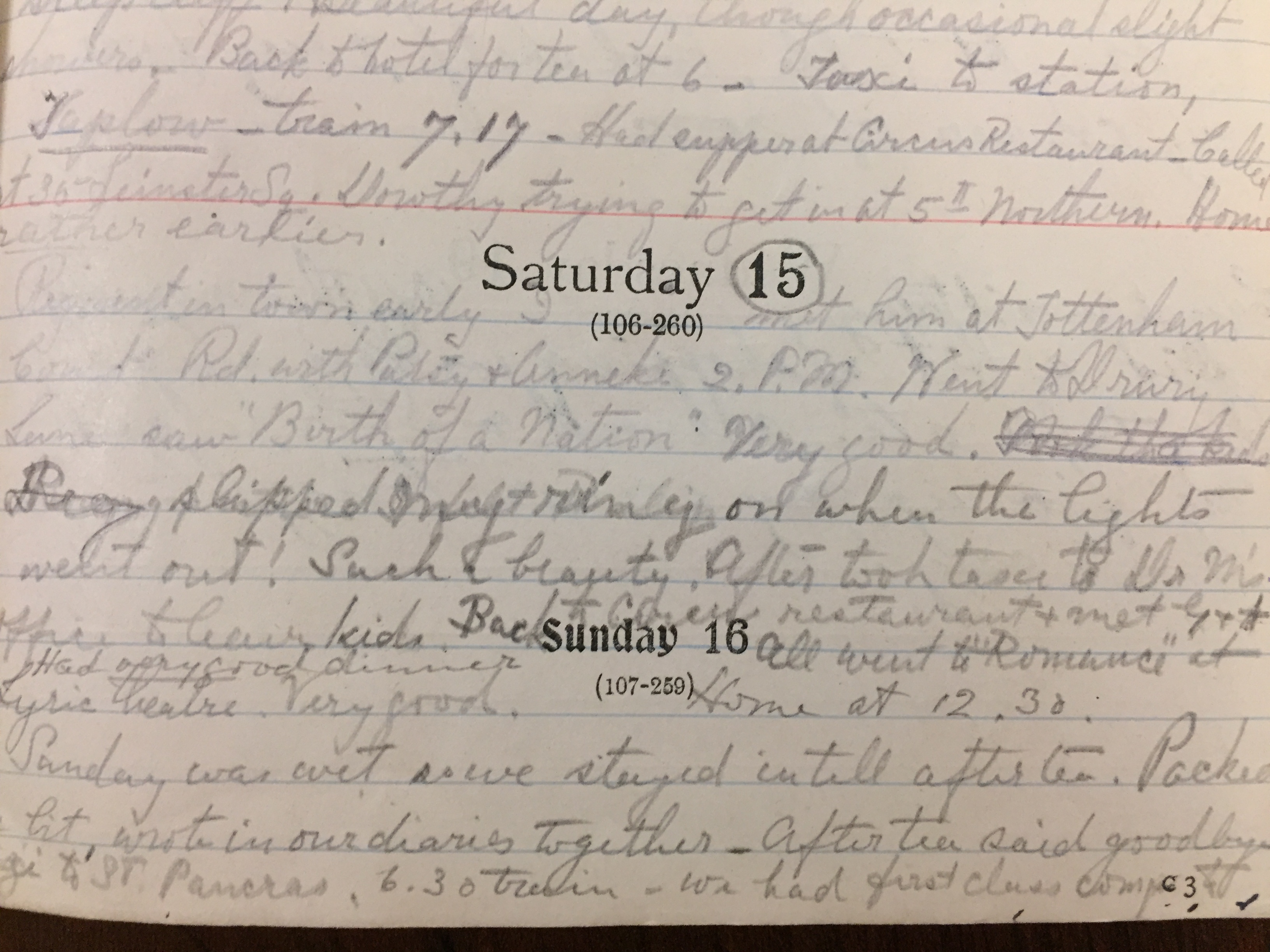
Reg had not asked for her father’s approval. Instead, he informed Howard Jones belatedly by post.
April 20, 1916
Dear Dr. Jones,
No doubt you know from Helen that I have had a week’s leave in England and that she managed a few days holidays at the same time.
Perhaps she has also told you that she is wearing a diamond that I gave her. Certainly, had we been at home this would not have happened for some time to come, but it is only because of the present conditions that I have taken the liberty. I trust that you will consent to her keeping it.
Naturally, it requires nothing more definite for a good while as present circumstances and prospects do not allow of such. But I like to have the thought that should anything happen to me out here, she has it.

Reg and Helen rarely saw one another over the next three years. The war brought Reg to Mesopotamia, including Baghdad. He took shrapnel in the shoulder in France — and Helen wrote about the pain of trying to unsuccessfully heal many damaged young men.
But they both survived.
They continued to write to one another throughout the war, sometimes chiding each other if too much time had passed between letters.
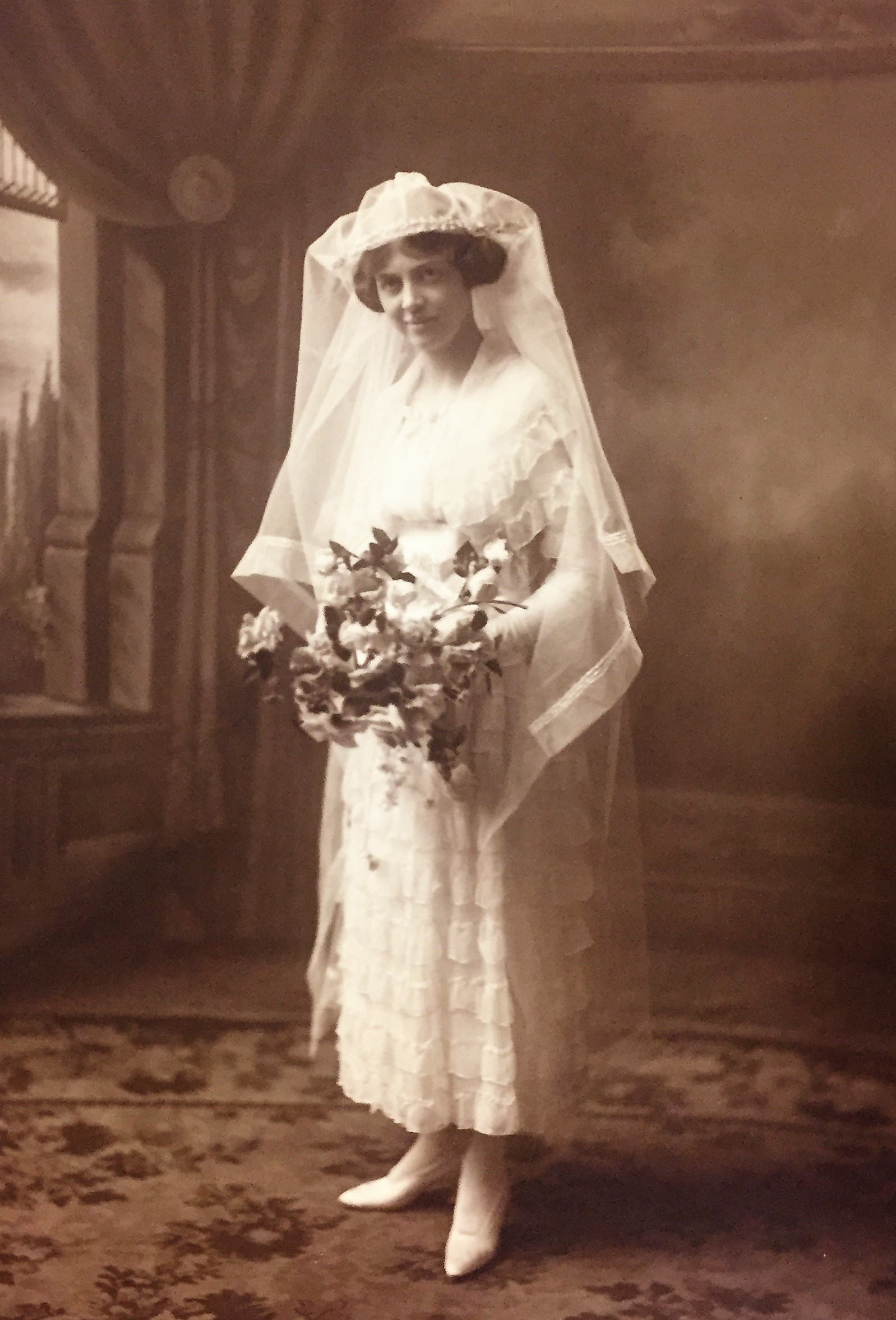
They married in 1920. They would have a son and a daughter, and Reg would help create one of the first major supply stores in Halifax, Harris and Roome. He would fight in another war when he was in 50s.
And, their grandson Howard van Allen says, he would always love his sweetheart, with whom he would celebrate 50 years of marriage, the latter of which was spent in Florida, the Barbados and travelling around the country in an trailer.
Helen died in 1974, Reg in 1985.
The letters were donated to the Nova Scotia Archives by Lorna van Allen, the couple's daughter, in 2015.
It’s easy to get lost in their story, captured at a time when letter writing was still an art form.
And, perhaps, it will offer some inspiration for those writing to their sweethearts today.
